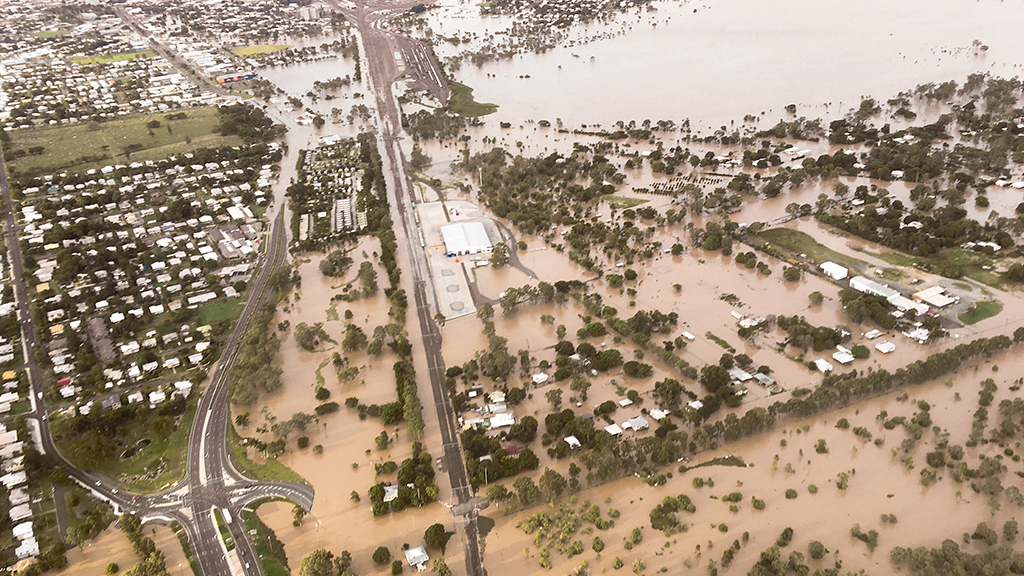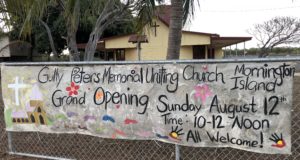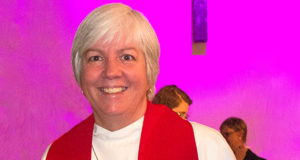While the massive clean-up after Cyclone Debbie and the associated record-breaking floods is well underway, it will take some months to count the real cost to the community. Journey reports on how the Uniting Church is supporting those impacted into the future.
Farmers, business owners and householders in north and central Queensland and northern New South Wales are still reeling from the impact of the natural disasters in late March and early April.
In the media the images of shattered buildings, flooded streets and muddy detritus have been replaced by images of decimated crops and damaged infrastructure as the long-term effects on community fabric and livelihoods unfolds.
Past moderator Rev Kaye Ronalds is the chair of the Queensland Synod Disaster Response Committee (DRC), which will disburse funds raised by the Uniting Church Foundation Disaster Relief Appeal. The appeal was launched in April to assist presbyteries and congregations to support recovery and build resilience in local communities.
“Recovery takes time,” says Kaye. “Some people have insurance for their homes, cars and possessions. But there may still be an excess to pay and if you have been through several disasters over a few years the cumulative impact is financial, psychological, physical and spiritual.”
Heartache ahead
Reports so far indicate significant damage in the North Queensland, Central Queensland and South Moreton presbyteries, with other damage in Mary Burnett and Bremer Brisbane presbyteries.
Central Queensland Presbytery minister Rev Brian Gilbert points out that the greatest impact is not always where the pictures are most dramatic.
“For example, the Callide Valley was warned again to prepare for flood—and the media gave notice that flooding in Emerald was a possibility. These areas have had numerous floods in recent years. This time Emerald didn’t flood and the extent of damage north of Biloela was nothing like the past. However, the people who were affected have to try to come to grips with yet another crop gone, yet another new fence washed away—three in four years,” he says.
“It will only be in the next few weeks that the consequences of the event appear in some people’s lives. The challenge will be to continue to identify the needs as they appear and respond as possible.”
Caring for the carers
Brian says that acknowledging and supporting those on the front line is an important part of community recovery.
“Many of the people in emergency and support services will have to cope with the impact of the disaster on their work experiences and the extra burdens they need to carry, as well as dealing with their own personal circumstances,” he says.
“Throughout this presbytery—whether the disaster has been flood, cyclone, or drought—the Uniting Church ministers in each location have done a marvellous job in responding to the needs of others while also coping with their own difficulties. They are to be thanked and congratulated for the way their ministry has impacted on and supported the lives of others.”
Help where it’s needed
After much experience supporting congregations in struggling communities, including the on-going drought which continues to devastate regional Queensland, Brian is well aware of the importance of empowering ministry agents and congregations.
“The government and insurance funds will assist many, but these are not always immediate nor sufficient. Sometimes government assistance does not apply in an individual’s circumstances … In affected areas where there are Uniting Churches, the ministers are very often aware of personal circumstances and the needs of individuals.”
Rev Linda Hamill from the DRC says that funds from the Foundation appeal will enable community support long after the immediate crisis has passed.
“The committee is not limited by time factors as are government and agencies responding for the government. Local congregations have been in place for years and plan to remain in place for years to come, so are well situated to work toward recovery but can also be committed to longer term resilience building.
“We can provide chaplaincy support to augment the work of a local congregation or to take up a particular project aimed at recovery or resilience. The committee is also responsible for supporting ministry agents through peer support so that ministers too can be nurtured and supported on the sometimes long road to recovery.”
In the North Queensland Presbytery, funds from the Foundation appeal enabled Presbytery minister Rev Garry Hardingham and local ministers Revs Jenny Potter and Tevita Mone to immediately move into action after Cyclone Debbie.
“We quickly assessed and got in contact with emergency services about when we would have access to that area. Our initial response was to get generators that we have around the presbytery into those places to try and restore some normality for people,” says Garry.
“As it was, we had to purchase three new generators, and on the Friday after the event I took them down. We put two into Proserpine and three into Bowen, and assisted the ministers to take them where they’re most going to be needed. We made that assessment with people who had medical needs or had young children as being priorities.”
Garry says that while communities in north Queensland are well versed in dealing with cyclones, what happens in the aftermath will be crucial.
“At the moment we’ve got in place what we need to get in place as far as the power and those sorts of services … what will be the effects in two months’ time when all the clean-up is done and everyone leaves the town? At that point we need to make an assessment of what kind of peer support we have to put in for the congregation, the ministry and the community.”
Money matters
One message coming loud and clear is the importance of financial aid.
“If you are going to donate to those areas don’t send old clothes and shoes and that sort of stuff—send money,” says Garry. “The businesses are still there and to get the town back running again [people can] use the money to buy the materials in the shops that keep the businesses open.
“In places after [Cyclones] Yasi and Larry, what happened was some shops were still functioning but they weren’t selling anything because people were given all this stuff so it actually drove some of the businesses broke.
“It’s really important for people to understand it’s about a whole community and getting them back on board. Money is really the most important thing they can send and prayer obviously.”
Generous hearts
Synod marketing and fundraising manager Raushen Perera says that Queensland Synod will act as the critical conduit between churches and communities in crisis.
“Thanks to support from the wider church in Queensland and across Australia to the Foundation appeal, we are able to offer assistance to communities in the short term when they need it most and in the long term to build resilience.
“It will be a long road to recovery but with everyone’s support, we will get there,” says Raushen.
Congregations and presbyteries with ideas for specific projects to provide pastoral support, rehabilitation and recovery programs for individuals, families and communities affected by the recent natural disasters can apply to the Queensland Synod Disaster Relief Funds Distribution Committee.
For more information contact disaster.relief@ucaqld.com.au or phone the Synod office on 1300 822 753
 JourneyOnline
JourneyOnline







